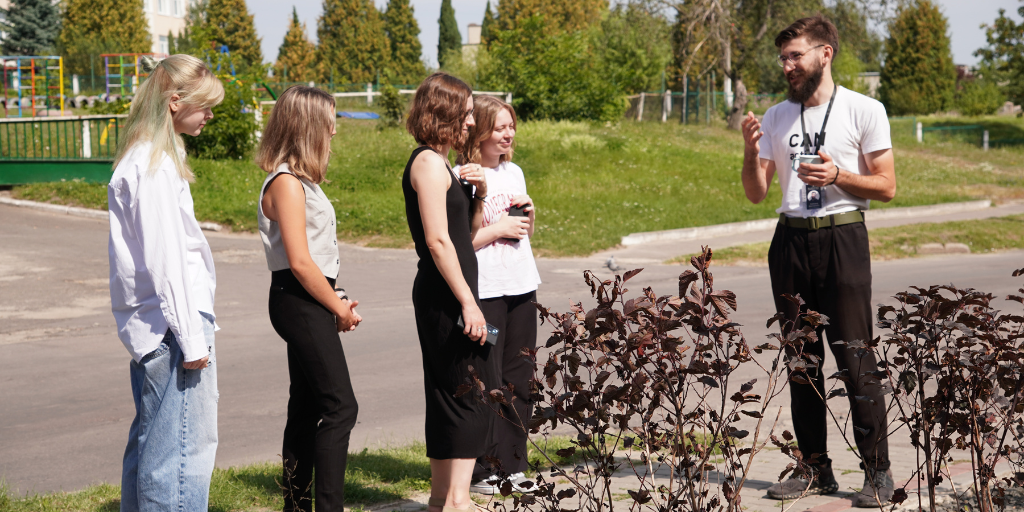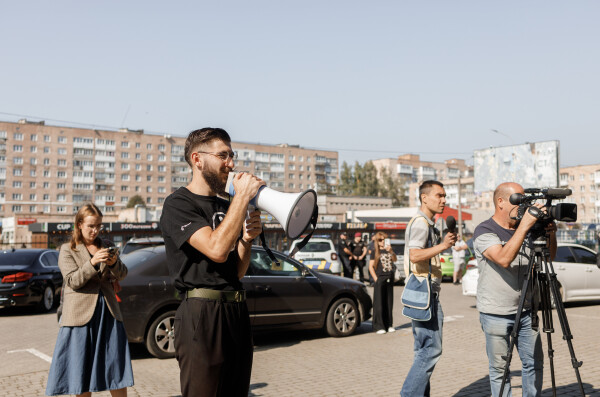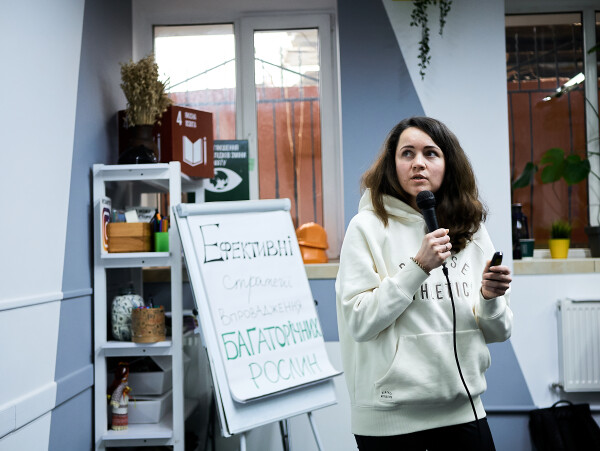
“Public spaces can form strong social ties and promote democracy. They are crucial for promoting democratic and values within communities,” says Lyubomyr Dmytryshyn, , founder of Seven Storey Mountain, a youth initiative in Lutsk in northwest Ukraine, that is focused on urban planning and inclusive city building.
Operating at the intersection of urban planning, civic engagement, and governance, Seven Storey Mountain is working to promote democratic participation in decision-making processes related to city development and is supporting youth communities throughout the region.
The organisation was founded in 2020 by a group of young activists and volunteers. Lutsk is an important cultural center in Ukraine, and in recent years it has also become a hub for youth activism.
“The ‘Seven Storey Mountain’ is an image from Dante's Divine Comedy,” explains Lyubomyr. “For Dante, hell, heaven, and purgatory have the shape of a city, and each space has a specific design. Hell is to punish sinners, and purgatory to purify them. For us, purgatory is an allusion to Ukrainian cities. Our cities are not ideal, but we are making progress. At the top of this mountain, there is a transition to paradise; to a just city.”
“Of course, the movement to a just city requires a lot of effort. Our mountain has many tiers, but it is also very strong and stable. We have shown this strength more than once during protests, trials, and public speeches at the city council,” he says.
From the beginning, Seven Storey Mountain attracted the attention of many young people, who wanted to make their city more inclusive, to fight against illegal construction, and to protect cultural heritage and historic sites and to play their part in Lutsk’s development.

“Western European cities are comfortable, people-centered, and environmentally friendly because city officials, public organisations, and individual activists put these issues on the agenda and took responsibility for decisions. We Ukrainians, must be responsible for our own cities and we should use these examples as inspiration. Europe does not end at the Ukrainian border. It is everywhere,” says Lyubomyr.
“It all started with lectures, trips, and internships,” explains Emilia Brovdi, a board member and a project coordinator.
“At first, we met to discuss things related to the city’s development, public spaces, and the community’s role in shaping Lutsk, and later, we took on more complex research projects on topics such as sustainable greening strategies and urban activism, often collaborating with others.”
The group has since expanded its scope to include advocacy, legal action, and participatory urban planning. They advocate for a model of urbanism that integrates governance with public participation, and holds workshops and participatory urban forums, engaging local residents in planning discussions.
“Urbanism is not just about architecture,” Emilia notes. “It involves community engagement, policymaking, and providing for public spaces that serve the people. Our goal is to create awareness among citizens about how city planning decisions are made and to help them influence policies that affect their quality of life.”
The young people took on the refurbishment of the Praizler guest house in Lutsk, a historic architectural site to create a lively youth ‘Guest Yard’ hub. They ran a crowdfunding campaign to fund the works. However, they later lost this space, when the city authorities leased it out in a non-transparent way to a public-private partnership. Their subsequent legal action against this decision brought them into conflict with the authorities.

Seven Storey Mountain’s work continues today amid the wartime challenges, with the team of 14 core members and volunteers conducting lectures and holding events across the country. Several members, including Lyubomyr, serve the army. Those who remain work through power outages, air raids and many other challenges.
“Civic work requires funding,” Emilia explains. “Rent, utilities, and wages don’t disappear just because the work is socially beneficial. This has become more and more challenging during these three years of war.”
EED’s support is the first institutional support the group has received to date. It has enabled them to launch a new space for young people, to have access to legal aid to safeguard them against legal cases initiated by the local authorities, to hold a series of lectures and events focused on urban planning, and to expand their educational programme and materials.
Lyubomyr believes that this work is changing things, by encouraging city councils to adopt more democratic decision-making processes and is providing residents with tools to influence local processes. One of the organisation’s long-term goals is to establish a more formalised civic engagement framework in urban planning.
“Municipalities need to recognise the value of civic input,” he says. “Stronger policies emerge when citizens have a say. I am convinced that people can make changes, and we are empowering them to do just that. Change comes from individuals taking action. Today, we are in a transitional period, but step by step, we are building more just and participatory cities. Right now, citizen involvement in city development is inconsistent. We want to create mechanisms that ensure public participation is not just an option, but a requirement.”
“Knowledge is power,” Emilia adds. “When people understand how urban planning works, they can advocate more effectively for their needs. Urban greening is not just about aesthetics,” explains Emilia, “Green spaces improve air quality, provide recreational areas, and help mitigate climate change. We are advocating for policies that integrate sustainable development into city planning. The more people understand their role in governance, the stronger our democracy will be.”
This article reflects the views of the grantees featured and does not necessarily represent the official opinion of the EED.
This initiative was supported thanks to the contribution of the European Commission to EED.